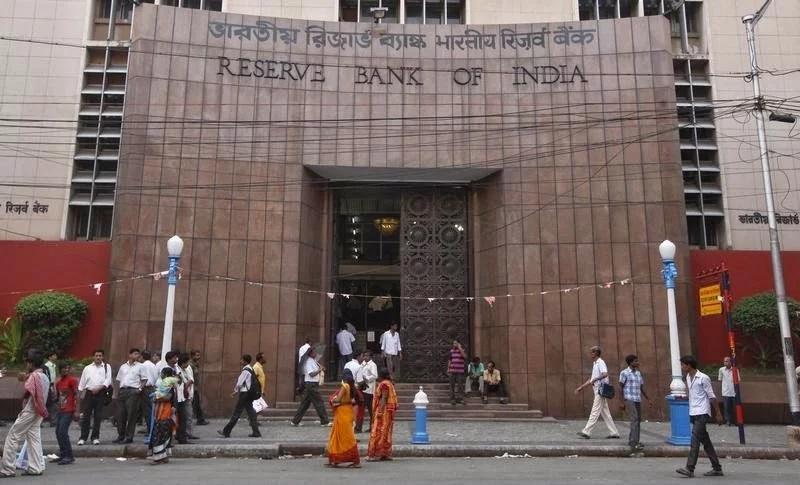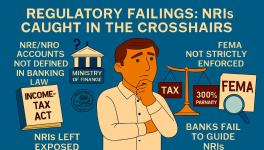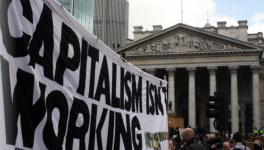Why the Debate on RBI Reserves is Entrapped in Neo-Liberal Homily

Entrapping all intellectual discussion within a particular discourse is the commonest method that neo-liberalism uses for establishing its hegemony. There was, for instance, the recent debate on the “autonomy” of the Reserve Bank of India (RBI), where one side wanted control over the RBI by the government and its coterie of “crony capitalists”, while the other wanted an RBI catering to the whims and caprices of globalised finance. The question of popular or parliamentary control over the institution was simply never raised. The same phenomenon of entrapping intellectual discussion within a particular discourse can be seen in the debate on a related issue, namely the use of RBI’s reserves to boost government expenditure.
The question to ask is: why should the government, which has the power to tax and borrow resources, feel the need to turn to the RBI’s reserves for increasing its expenditure? The answer is that it does not have real power within the neo-liberal dispensation to do anything that is disliked by globalised finance; and since finance dislikes both taxes on capitalists and fiscal deficits (taxes on the working people to finance larger expenditure would increase neither employment nor welfare), it finds itself in a bind. Its compulsion to turn to the RBI’s reserves for increasing expenditure in this election year derives from this fact, which is rooted in the reality of the neo-liberal regime.
Camouflaging Fiscal Deficit
There is a further point to note here. Using the RBI’s reserves actually amounts to an increase in the fiscal deficit, though it would not figure as such in the government’s budget. An obvious way that these reserves can be drawn down is by increasing the dividend payments from the RBI to the government, which owns it. In the budget, such dividend payment would appear as an additional income for the government and if its expenditure rises by an equal amount, then the fiscal deficit would have remained unchanged; higher expenditure, in other words, would have been financed without raising the fiscal deficit.
But this conclusion arises entirely because we are focusing attention on the government proper. If we take the government sector as a whole, including not only the government proper but also government-owned institutions, like the RBI, then for this sector as a whole while expenditure would have gone up (because of larger government spending), income would not have.
Dividend payment by the RBI to the government amounts merely to a transfer from one entity to another within the government sector, but not to an increase in the income of the sector as a whole. Hence, the deficit of the government sector as a whole would have gone up by an amount equal to the increase in government spending, even though it would not show itself as an increase in fiscal deficit in the government budget. Its macroeconomic effects, however, should be exactly the same as that of a fiscal deficit. In other words, increasing government spending by using the RBI’s reserves amounts to a camouflaged fiscal deficit.
Why Finance Capital Dislikes Fiscal Deficits
The question immediately arises: why not an open fiscal deficit? The proximate answer, already given, is that finance capital disapproves of fiscal deficits; and when finance is globalised while the State remains a nation-State, the writ of finance must run, for otherwise there would be a flight of finance from the country in question causing a financial crisis. But why does finance dislike a fiscal deficit? The theoretical argument usually advanced against a fiscal deficit, namely that it causes inflation, cannot stand scrutiny.
Inflation, leaving aside the “cost-push” variety which in any case has nothing to do with a fiscal deficit, arises from excess aggregate demand at base (i.e. pre-inflation) prices, which cannot be eliminated through an increase in supply. To say that a fiscal deficit gives rise to inflation amounts, therefore, to assuming that the economy is always at “full employment”, i.e. there is never any deficiency of aggregate demand in the economy and the so-called “Say’s Law” holds. This is a palpably absurd assumption, though much used in “mainstream” economic theory.
In fact, capitalism is typically a demand-constrained system, where “full employment” has never characterised even the top of the boom, let alone “normal times”. Enlarging the fiscal deficit in these conditions can increase employment and output without raising prices to any significant extent. India, in particular, has been characterised by unutilised capacity in industry and above-“normal” levels of foodgrain stocks virtually throughout the period of economic liberalisation. Hence, an increase in fiscal deficit would not give rise to inflation via excess aggregate demand but would instead raise output and employment. True, it can spill over into larger imports and hence a larger current account deficit on the balance of payments, but that needs to be checked not by keeping demand low but by imposing import restrictions which even Donald Trump has now introduced in the United States.
The dislike of finance towards a fiscal deficit, therefore, has nothing to do with its purported ill-effects which cannot arise in a demand-constrained economy. It has to do with the fact that if larger government expenditure, and that too financed not through taxation but through larger borrowing which does not immediately hurt anyone, is institutionalised as an essential element in the economy’s functioning, then that serves to de-legitimise the role of the capitalists. Having a bunch of capitalists whose “animal spirits” have to be carefully nurtured through concessions and subsidies, would then no longer be deemed necessary.
The opposition of finance capital to fiscal deficits, though sought to be justified by all sorts of spurious theoretical arguments, such as linking these deficits to inflation in all circumstances, arises for this fundamental reason, and gets institutionalised everywhere through “Fiscal Responsibility” legislation. The need to camouflage a larger fiscal deficit arises because of this. And using the RBI’s reserves for increasing government expenditure, though it is nothing else but an increase in the fiscal deficit, does not appear as such in the government budget, and hence can be passed off as “harmless”.
The whole argument about drawing down the RBI’s reserves for financing larger government expenditure thus takes the neo-liberal economy and the constraints it imposes upon the government for granted; but it seeks to find a way around these constraints because of electoral compulsions. The theory advanced is that while a fiscal deficit is bad because it is inflationary, using the RBI’s reserves is not the same as enlarging the fiscal deficit. The opponents of this argument likewise take the constraints imposed by the neo-liberal economy for granted and also accept this theory; their objection is that the government should not order the RBI around.
The debate is within the context of a neo-liberal regime but nowhere is this fact recognised. A discourse confined to the context of a neo-liberal regime is sought to be portrayed as a general theoretical discourse, which means that the neo-liberal regime is sought to be depicted as the only possible universe that could possibly exist. By entrapping everyone within this discourse, the hegemony of neo-liberalism is ensured, since everyone discusses the issue while confining attention to the neo-liberal regime itself, but not looking beyond it.
Once we recognise that using the RBI’s reserves is no different from enlarging the fiscal deficit, and also that such an enlargement is not necessarily deleterious (though no doubt deficit-financed government expenditure is worse than tax-financed government expenditure), it becomes possible to critique the neo-liberal regime itself. It becomes possible to argue that government expenditure should be expanded, on welfare and social-sector programmes, through raising larger tax revenue from the rich, but, failing that, even through a higher fiscal deficit, irrespective of whether RBI reserves are used for this purpose.
When the government is running even the MGNREGS to the ground, the idea that there are no resource constraints per se but only the caprices of finance capital that come in the way of government spending, is an important point to bear in mind. This point is sought to be obscured by the public discourse that neo-liberalism promotes. The Left must expose this entrapping discourse.
Get the latest reports & analysis with people's perspective on Protests, movements & deep analytical videos, discussions of the current affairs in your Telegram app. Subscribe to NewsClick's Telegram channel & get Real-Time updates on stories, as they get published on our website.
























